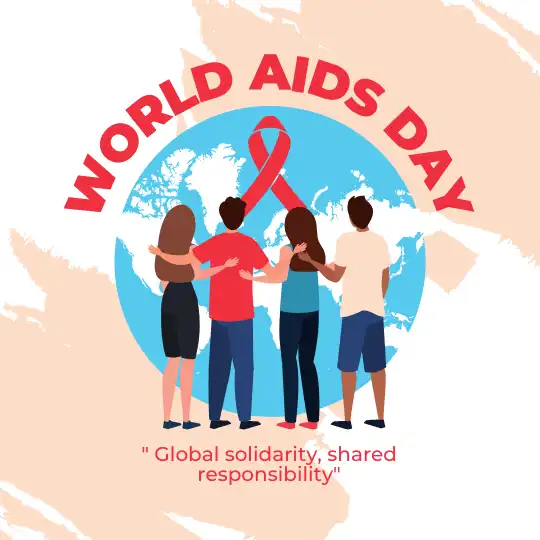World AIDS Day on December 1 offers a chance to inspire people to work together globally to remove the disparities and inequities that obstruct HIV testing, prevention, and access to care; to show support for those who are living with HIV; and to remember those who have passed away from an AIDS-related illness. World AIDS Day was first commemorated in 1988.
You can contribute to the World AIDS Day commemoration by:
- wearing a red ribbon
- getting tested to know your status
- contributing to fundraising
- showing love to people around you who are affected by HIV/AIDS
HIV fast facts:
- About 1.2 million Americans live with the virus, with about 13 percent unaware of their status.
- Compared to 2015, the annual HIV infection rate decreased in 2019 among persons aged 13–24 and 45-54 but remained stable among all other age groups with the highest rate found in persons aged 25-34.
- In 2019: The annual HIV infection rate was highest for Blacks/African American persons, followed by Hispanic/Latino persons and persons of multiple races. The rate of males contracting HIV infection was 5 times the rate of females. An estimated 34,800 new HIV infections occurred in the U.S. 8% decrease from 2015 (37,800).
How is HIV different from AIDS?
HIV (human immunodeficiency virus) is a virus that attacks and destroys the immune cells of the body causing a person more vulnerable to other infections and diseases. AIDS (acquired immunodeficiency syndrome) is the result of HIV infection after the body's immune system has been badly damaged.
Is HIV self-resolving like many other viral infections?
The human body can't get rid of the virus itself and it has no cure yet. Once you get it, you have it for life. However, there are effective medications to stop the progress and prevent its harm to the person's health.
How do you catch HIV?
HIV is spread by contact with certain bodily fluids of an infected person during unprotected sex or by sharing injection drug equipment such as needles.
How do you prevent HIV?
You can prevent HIV infection by:
- always using a condom during sex
- never sharing injection drug equipment such as needles
- getting tested for HIV
- using pre-exposure prophylaxis (PrEP) and post-exposure prophylaxis (PEP)
- protecting others if you have HIV
How do I know if I have HIV?
You can only know your HIV status if you get tested. Ask your healthcare provider for an HIV test, use HIV Service Locator to find your nearest test center, or use an HIV self-testing kit like OraQuick HIV Self-Test.
What are the symptoms of HIV?
In the early stages of HIV infection, you may show mild to chronic signs and symptoms such as:
- fever
- fatigue
- swollen lymph nodes
- diarrhea
- weight loss
- oral thrush
- shingles (herpes zoster)
- pneumonia
Does HIV always lead to AIDS (end stage of HIV)?
No. In the United States, most people use HIV medications to stop the progression of HIV infection and they do not develop AIDS.
There are many drugs in different classes prescribed to slow the progression. These include:
- Abacavir (ABC, Ziagen),
- Didanosine (ddI, Videx)
- Emtricitabine (FTC, Emtriva)
- Lamivudine (3TC, Epivir)
- Stavudine (d4T, Zerit)
- Zidovudine (AZT, Retrovir)
- Tenofovir disoprovil fumarate (TDF, Viread)
However, for those who do not use HIV medication, it typically takes 8 to 10 years for an HIV infection to progress to AIDS.
AIDS is diagnosed in a person with HIV infection when one or more of the following occur:
- Their number of CD4 cells falls below 200 cells per cubic millimeter of blood. CD4 cells are immune cells that range from 500 and 1,600 cells/mm3 in a healthy person.
- They develop one or more opportunistic infections irrespective of their CD4 cell counts. People with AIDS, despite being in the late stage of HIV infection, will still benefit from HIV medications. But people who are diagnosed and start the medications early will experience more benefits. That is why HIV testing is so important for early diagnosis.
What are the symptoms of AIDS?
People with AIDS come down with an infection that does not normally affect people with an intact immune system. These infections are called opportunistic infections; their signs and symptoms may include:
- sweats
- chills
- recurring fever
- chronic diarrhea
- swollen lymph glands
- persistent white spots or unusual lesions on your tongue or in your mouth
- persistent fatigue
- weakness
- weight loss
- skin rashes or bumps
What is the life expectancy of people with AIDS?
People with AIDS typically survive about 3 years without taking HIV medications. However, the life expectancy falls to about 1 year without taking HIV medication for people with a dangerous opportunistic illness.
Is there a way for people affected by HIV to save on their medications?
Save money on your HIV medications with the RxLess saving cards. Our free discount card can save you up to 88% on your medications in many pharmacies including CVS, Rite Aid, and Walgreens.

















